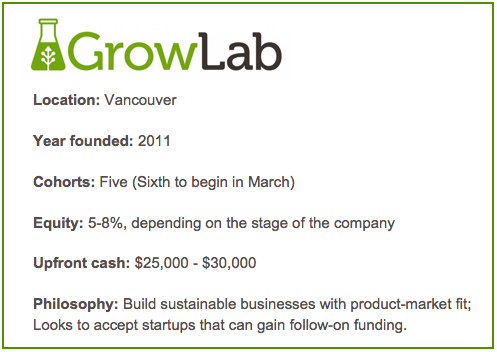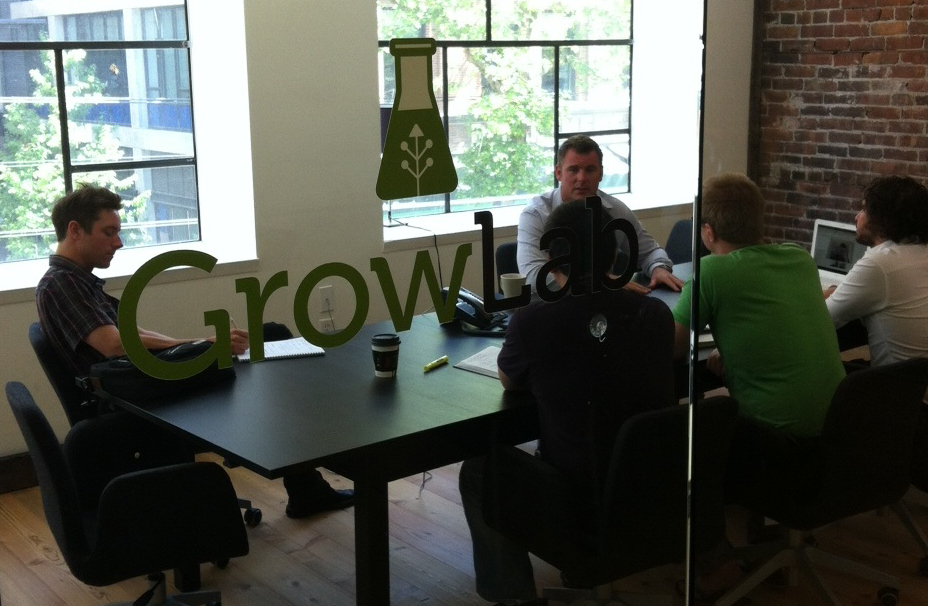The Accelerator Series is a multi-part spotlight on Canada’s startup accelerators and the people who lead them.
GrowLab Looks to a New Leader in Jonathan Bixby
The current chapter in GrowLab‘s story revolves around a changing of the guard. The program that Mike Edwards of LX Ventures helped cofound and build up over several cohorts of startups looks to a new leader in experienced entrepreneur Jonathan Bixby.
It’s an exciting time for the Vancouver-based accelerator, as GrowLab looks to become a leader in attracting foreign talent as part of the federal Startup Visa program while strengthening its ties with Silicon Valley. GrowLab started in the summer of 2011 and at the time over 350 teams applied for spots.
Even with the change in leadership the accelerator’s core philosophy remains the same. It hunts for companies that have a strong potential to raise follow-on funding after departing the program. As well, GrowLab continues to focus its companies on growth of sales, establishing the oft-fantasized badge of honour in the startup world, “product-market fit.”
Bixby comes in having established a track-record of success in building and exiting startups, something that will fare well as he leads the next group of companies. His last startup, Strangeloop sold to Radware (RDWR/Nasdaq) almost one year ago. He also cofounded and exited with Ironpoint, when Active Network acquired it in 2006. In between those exits he helped ClearVision Technology exit to Valco in 2012.
After Strangeloop Bixby took eight months off to travel Asia, Europe and Australia with his family, taking it easy before his next big challenge. Edwards brought him into GrowLab as Entrepreneur-in-Residence, a kind of “feeling-out process” as Bixby described it. On November 1st he was named GrowLab’s executive director.

Thus far the accelerator has taken five to eight percent equity stake in companies, depending on how mature the company is, usually giving $25,000 to $30,000 up-front cash. The program’s funding comes from a group of investors including the BDC, Rho Canada Ventures, iNovia Capital, Yaletown Ventures, Growthworks Ventures and several angel investors.
Edwards said a prototypically successful company that came out of the program was ePact Network, an emergency communication platform that “had a product and initial customers, had raised some early financing and we were able to fine tune their message, fine-tune their audience and help them pivot their product into a bigger opportunity.”
ePact now acts as an alumni mentor, another new approach GrowLab is trying to emphasize, which is only possible now that it has seen 23 startups go through the program. Edwards desires to see its alumni — “one of our most important assets” — take on a bigger role in mentoring the new companies who join GrowLab.
“Finding out that the world wants your stuff is a pretty good philosophy”
Once March rolls around, Bixby will lead his first cohort. While some companies entering the program have proved themselves to be more mature, he said several aren’t and like the rest of the accelerator community in Canada, GrowLab is learning how to best approach this from a mentoring perspective.
In the beginning it may have been about preparing companies for a demo day pitch in front of investors, but not anymore. “I think people are seeing that companies aren’t at the stage of being ready to get investment after three months in an accelerator program, so I think this philosophy has certainly shifted and Grow Lab feels the same: let’s build a real business here.”
Traction is the word for Bixby, along with sales, product-market fit and strong business development. “Finding out that the world wants your stuff is a pretty good philosophy that’s well time-tested from my perspective.”
Perhaps part of the solution will be a stronger relationship with the Valley, sentiments from Edwards that were echoed by Bixby. They’re a two-hour flight from San Francisco and one of GrowLab’s cofounders, Deb Landa, is a “major player” there too. It’s time to take advantage of that, and the program started by taking its most recent cohort down south for two weeks for a C100 event.
Bixby has also been charged with ensuring what could either be seen as an extremely opportunistic or arduous task: sifting through high-potential foreign startups looking to get a fast-tracked Startup Visa, and inviting them to Vancouver. GrowLab was recently selected as one of the Startup Visa program’s official accelerators. “We believe that’s a competitive differentiator, so I think you’re going to see more international talent,” he said.
GrowLab is in a safe place for the next few years under Bixby’s command, the director who is currently tasked with reviewing 10-15 startup applications every week for the Spring 2014 cohort (he said over 300 startups have applied).
But will it all last under the typical Canadian startup accelerator’s current business model? Can these programs sustain themselves over the long term in an industry that is still largely inexperienced?
A humble Bixby admitted he might be the “greenest of all people,” a nod to his still new career. But, there’s two aspects in running an accelerator, he said, economic development and making money. “And we can’t confuse the two.”
Accelerators provide jobs for people but it’s “badly trying to get a return” for its investors, and that blurs things a bit.
“Economic development is usually not a money-maker, and investment should be, so how do you balance the two out? For me the solution is quite simple, which is, just like a VC you need optionality. What VCs do really well is they create options,” he said.
A program like GrowLab does this well: in fact, they create options at a tenth of the price when they only invest around $30,000 in a startup entering the program. The problem is it’s not always capable of making follow-on “series A” investments.
He pointed to Montreal’s Real Ventures as a model that can be more successful than others. The firm takes several smaller bets in the FounderFuel accelerator startups and only makes bigger bets (series A investments) on the “cream of the crop,” or the most high-performing companies.
“That’s the model where I believe this makes sense,” but he also admitted that even then, a “black swan” company needs to come along, one that grows into a runaway success like Vancouver’s Hootsuite.
How GrowLab’s structure plays out in the next few years remains to be seen. In the meantime though, it looks like the companies will benefit from someone who might know a black swan when he see’s one.
Have you check out the rest of the series?
Part One: Hyperdrive (published January 13)





